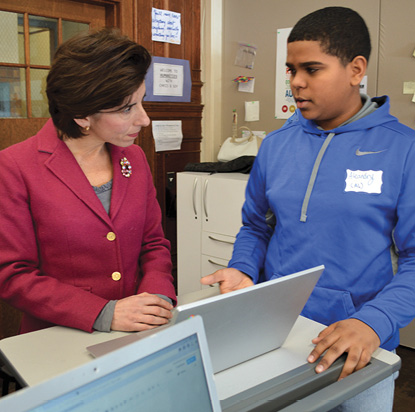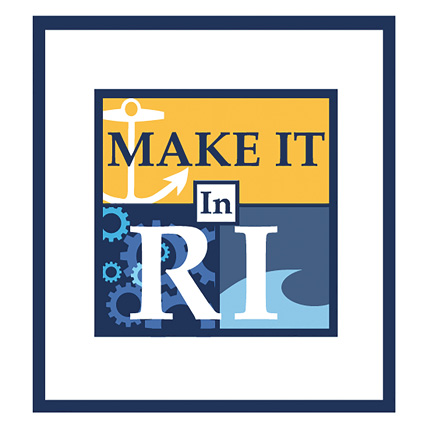- Home
- Media Kit
- Current Issue
- Past Issues
- Ad Specs-Submission
- Ad Print Settings
- Reprints (PDF)
- Photo Specifications (PDF)
- Contact Us

![]()
ONLINE


The Hon. Gina M. Raimondo with a
Rhode Island student
A Place of Opportunity
Editors’ Note
On January 6, 2015, Gina M. Raimondo became the 75th Governor of Rhode Island and the first woman to hold that office. She graduated with honors from Harvard and won a Rhodes Scholarship to Oxford University where she earned a doctorate. She later graduated from Yale Law School, and then clerked for U.S. District Judge Kimba Wood, and also served as a founding employee and Senior Vice President at Village Ventures. She later co-founded Point Judith Capital and was involved in dozens of successful start-up companies. In November of 2010, Raimondo was elected to serve as General Treasurer of Rhode Island, where she tackled the state’s estimated $7 billion unfunded pension liability and propelled the passage of the Rhode Island Retirement Security Act of 2011.

What steps are you taking to ensure the job focus for Rhode Island that you put in place is being implemented?
Unfortunately, Rhode Island has experienced a stalled economy for a long time. My focus is not just on creating jobs but creating high-paying, high-skill, and high-wage jobs, which is exactly where we’ve lagged.
If we can do that, we’ll have money to make investments, reduce our budget deficits, and make Rhode Island a place of opportunity for people. It’s the core focus of everything I’m doing.
Where are you in terms of tracking metrics to make sure you have the impact you were aiming for?
One metric I’m looking at is jobs created and, last year, our economy created nearly 6,000 jobs. We also had the second highest reduction in unemployment of all the states in the country. So we have momentum and we have to sustain it.
There is not just one silver bullet. We need to have a low and competitive tax structure, a deep pipeline of talent, and fiscal stability. Throughout the time I’ve been in public office, I have retained a clear focus on pensions and Medicaid, and have successfully been able to rein in the costs of those two programs.
What is being done to improve education within Rhode Island?
Since I’ve been Governor, we have tripled the number of pre-K classrooms and we’ve put forth funding to create universal all-day Kindergarten. I also started a program so that every high school student can take college classes to gain free college credits.
We are making progress, but we have to do more. In Rhode Island, the good news is it’s not a money problem – we have the seventh highest spending per pupil in the country. We’re just not getting enough return from this so we need to continue to focus on results and accountability.
Are the competitive advantages Rhode Island offers well understood?
No, I don’t think it is, which is why I’m getting out there as much as I can to tell that story.
Recently, I met with a CEO, originally from Europe, who moved to Rhode Island to run the company’s stateside operations. I told him that we haven’t raised a major tax in 20 years, and that we have amazing colleges and universities, a gorgeous coastline, and a high quality of life – he wasn’t fully aware of these things. So much of my job is getting out there and telling Rhode Island’s story, because when people hear it, they find it very compelling.
Has it been critical for you to reinforce public/private partnership and how important is that in driving change?
It’s essential. I believe very strongly that if we’re going to revive our economy in Rhode Island, everyone has a role to play. The government cannot do this alone. Business leaders have to ask how they can help; philanthropists have a role to play, as do the citizens. Together, we won’t fail.
I reach out all the time to business and other leaders to ask for help or for investment, or to help recruit a company, and they are all very happy to jump in. That’s an asset Rhode Island has. Everyone loves it and people want to be part of our success.
What kind of emphasis do you put around healthcare reform in the state?
I’m proud of the work we’re doing in healthcare because we are further along than most states in terms of achieving the goal of everyone having affordable coverage.
Right now, 95 percent of Rhode Island’s entire population has health insurance and 97 percent of our kids have health insurance. Compared to most states, we also have higher access to high-quality care.
On top of that, we’re controlling the cost. Many states have struggled with 15 to 20 percent increases in insurance premiums, but we haven’t. We are relatively stable. Based on work we did last year, we’re now covering more people on Medicaid and spending less to do it.
This is a big deal – Rhode Island is a real innovator when it comes to healthcare, which has led to us being ahead of most states in getting to that Holy Grail of access, quality, and affordability.
How critical has it been to avoid broad-based tax increases and what message do you hope that sends?
We want to be a pro-growth state where it’s easy to do business and not too expensive. We want businesses to want to settle here and to grow, which leads to more jobs.
This doesn’t mean we give businesses everything they want, but it does mean we need to have a predictable, reasonable, and stable tax structure. Rhode Island offers that.
How important is transparency for the state to engage its citizens?
Unfortunately, many people don’t trust their government. One way to rebuild trust in government is to have people be engaged and fully informed.
I’m the first Rhode Island governor to put my budget online in a dynamic tool, making it easier for people to understand how the budget is broken down. We are doing that to encourage people to look at it and see where and how their money is being spent. Taxpayers need to know what is going on with their dollars and they need to get engaged.
Have you been happy with how the legislature in Rhode Island has been open and willing to work together?
Last year, I put a budget forward to our General Assembly and it was passed unanimously in the House of Representatives. When I did pension reform, which was very difficult, it was passed by huge margins in the House and Senate.
At least in Rhode Island, we have shown time and again that we can forge consensus, we can compromise, and we can deliver results.•